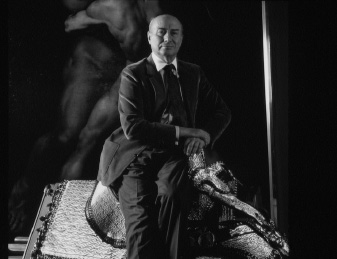Paolo Gucci
Paolo Gucci, designer of fashionable goods, and black sheep of his family, died on October 10th 1995, aged 64

The famous families of Italy have had mixed fortunes. “I can find no one who can definitely suggest a basis for agreement among them,” observed Machiavelli, normally a cool customer, trying to keep his temper in his dealings with Cesare Borgia, the head of the nastiest family in Italian history. Machiavelli might have been equally at a loss had he had to deal with the Guccis. This is one of the industrious families that have been the driving force of Italy’s economy. But the family ended up by destroying itself. Simple quarrels led to assault, litigation and betrayals. Paolo Gucci has been mostly blamed for the destruction of the family. He was said to be the black sheep. His defenders say that at least he was a designer of brilliance and had vision.
Italy’s talent for creating agreeable things has been a redeeming feature in a century that otherwise has not treated the country well. Its most famous politician, Mussolini, was the mentor of Hitler. Italy chose the losing side in the second world war, and its post-war politics have been steeped in corruption on a massive scale. But it has produced great film-makers, such as De Sica, great novelists, such as Moravia, and at least one key group of artists, the Futurists. For Paolo Gucci this was the real Italy, creative and civilised. And, because he was born into a rich family, he could indulge himself in its pleasures.
Grandpa Guccio Gucci had founded the family fortunes in the early years of the 20th century with a leather goods shop in Florence. By the 1950s there were shops in posh districts of other cities, including New York. Paolo Gucci, the designer of nearly all the delectable Gucci products, then proposed to sell them to a wider market than that provided by the family shops.
These days this seems an obvious idea, with such firms as Armani and Cartier cultivating a mass-market while still suggesting exclusivity. As far back as 1899, Thorstein Veblen, an American economist (whose pioneering book on consumerism Mr Gucci probably read), had predicted that, as wealth spread, people would buy things that enhanced “their esteem and envy” among their fellows. But Mr Gucci’s father, Aldo, and an uncle, Rodolfo, wanted to continue to produce items only for the select few. Eventually they were persuaded, though reluctantly, by Paolo’s promise of untold riches.
He was spectacularly successful, particularly in America. His designs, bearing the Gucci logo and a band of green, red and black, became a mark of personal affluence. So many political lobbyists wore his shoes in Washington that their favourite stamping ground became known as Gucci Gulch. At one time around 14,000 items carried the Gucci logo, not just handbags, headscarves and scent, but coffee mugs and key-rings. It may be a sort of compliment that in Asia they were the most pirated of western products.
Despite the profits involved, Mr Gucci’s father and other members of the family turned on him for popularising, and, worse, Americanising, the family name. In their view he had turned his back on Italy. Even his private life was seen as more American than Italian. He had been divorced, had abandoned a second wife and lived openly with a third woman. TraditionalistItalians are supposed to stay married, with mistresses a tolerated secret. Once Mr Gucci emerged from a board meeting with blood pouring from a gash in his face. “You see what happens when the Gucci board of directors meets,” he shouted to delighted reporters. He claimed his attackers had included his father and others in the family. He sued them, and the case drifted on expensively for years. Whatever the provocation, Italy was shocked when, as a result of information provided by Mr Gucci, his 81-year-old father, Aldo, was jailed in America for tax dodging. Mr Gucci was sacked by the family firm, but ran his own business for a time, trading, not very successfully, as “Paolo Gucci”. Then there was Maurizio, a cousin who ran part of the Gucci empire. He was accused by Aldo Gucci of falsifying his father’s will. An unknown gunman killed him in Milan in April.
The Gucci business no longer belongs to the family. In the 1980s sales slipped, possibly because of a general dip in the fashion business, possibly because the family lost heart. The family sold out to an investment group. The Gucci company has now been granted a listing on the New York stock exchange. On October 24th, the first day of trading, the company was in demand.
Aldo, Rodolfo, Maurizio and now Paolo are dead. But the Gucci quarrels may not yet have subsided. Mr Gucci is believed to have left property worth about £3m ($4.7m), including a country house in England and a number of racehorses. His will, if he left one, could be of interest to two brothers, one wife, one ex-wife, a mistress and five children.